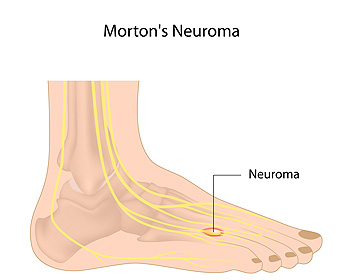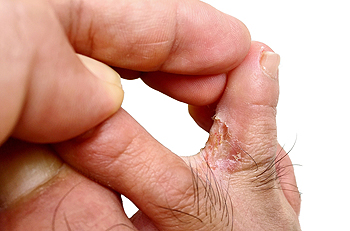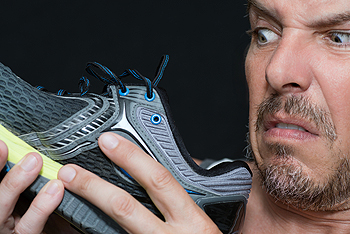
A pinched nerve that is located between the toes may be referred to as Morton’s Neuroma. It may occur as a result of an injury that happened to the foot, and the pain that is felt is generally on the ball of the foot as it radiates from the toes. When a diagnosis is performed, the range of motion is checked, and this is helpful in looking for arthritis or inflamed joints. Additionally, it is important that an X-ray or MRI is performed, as this may be beneficial in ruling out other ailments. Moderate relief may be found when the correct shoes are worn, and it may help to add support to the affected area by taping the foot. If you are afflicted with Morton’s Neuroma, it is advised that you speak to a podiatrist who can guide you toward the proper treatment, which may include surgery.
Morton’s neuroma is a very uncomfortable condition to live with. If you think you have Morton’s neuroma, contact Dr. Alexander Terris of Total Foot Care. Our doctor will attend to all of your foot care needs and answer any of your related questions.
Morton’s Neuroma
Morton's neuroma is a painful foot condition that commonly affects the areas between the second and third or third and fourth toe, although other areas of the foot are also susceptible. Morton’s neuroma is caused by an inflamed nerve in the foot that is being squeezed and aggravated by surrounding bones.
What Increases the Chances of Having Morton’s Neuroma?
Morton’s neuroma is a very treatable condition. Orthotics and shoe inserts can often be used to alleviate the pain on the forefront of the feet. In more severe cases, corticosteroids can also be prescribed. In order to figure out the best treatment for your neuroma, it’s recommended to seek the care of a podiatrist who can diagnose your condition and provide different treatment options.
If you have any questions, please feel free to contact our office located in Wilmington, DE. We offer the newest diagnostic and treatment technologies for all your foot care needs.
Read more about Morton's Neuroma The medical condition that is known as athlete’s foot is caused by a fungus. Common names for this ailment can include tinea pedis and ringworm of the foot. The symptoms that are typically associated with athlete’s foot can consist of itching on the bottom of the feet and between the toes, in addition to dry, flaky, and cracking skin. In severe cases, there may be small blisters that form which may ooze. This type of fungus generally lives and thrives in warm and moist environments. These can include public swimming pools, locker rooms, and shower room floors. Research has shown that there are methods that can be implemented which may prevent this contagious condition. These can consist of wearing appropriate shoes while in these areas, and avoiding sharing shoes and towels. If you believe you have developed athlete's foot, it is advised that you consult with a podiatrist who can determine what the best treatment is for you.
The medical condition that is known as athlete’s foot is caused by a fungus. Common names for this ailment can include tinea pedis and ringworm of the foot. The symptoms that are typically associated with athlete’s foot can consist of itching on the bottom of the feet and between the toes, in addition to dry, flaky, and cracking skin. In severe cases, there may be small blisters that form which may ooze. This type of fungus generally lives and thrives in warm and moist environments. These can include public swimming pools, locker rooms, and shower room floors. Research has shown that there are methods that can be implemented which may prevent this contagious condition. These can consist of wearing appropriate shoes while in these areas, and avoiding sharing shoes and towels. If you believe you have developed athlete's foot, it is advised that you consult with a podiatrist who can determine what the best treatment is for you.
Athlete’s foot is an inconvenient condition that can be easily reduced with the proper treatment. If you have any concerns about your feet and ankles, contact Dr. Alexander Terris from Total Foot Care. Our doctor will treat your foot and ankle needs.
Athlete’s Foot: The Sole Story
Athlete's foot, also known as tinea pedis, can be an extremely contagious foot infection. It is commonly contracted in public changing areas and bathrooms, dormitory style living quarters, around locker rooms and public swimming pools, or anywhere your feet often come into contact with other people.
Solutions to Combat Athlete’s Foot
Athlete’s foot can cause many irritating symptoms such as dry and flaking skin, itching, and redness. Some more severe symptoms can include bleeding and cracked skin, intense itching and burning, and even pain when walking. In the worst cases, Athlete’s foot can cause blistering as well. Speak to your podiatrist for a better understanding of the different causes of Athlete’s foot, as well as help in determining which treatment options are best for you.
If you have any questions please feel free to contact our office located in Wilmington, DE. We offer the newest diagnostic and treatment technologies for all your foot and ankle needs.
Read more about How to Deal with Athlete's Foot Foot pain may be a common ailment among elderly people. This may be a result of the amount of walking and running that has occurred during their lifetimes. It is beneficial if the soles of the feet are regularly checked by a podiatrist to determine if there are cuts on the feet that will not heal. The socks that are worn should fit correctly, be seamless, and be made of cotton, which is a breathable material. A podiatrist will trim the toenails correctly, which can be helpful if there are existing circulation issues. If you or an elderly relative needs help in caring for the feet, please consult with a podiatrist.
Foot pain may be a common ailment among elderly people. This may be a result of the amount of walking and running that has occurred during their lifetimes. It is beneficial if the soles of the feet are regularly checked by a podiatrist to determine if there are cuts on the feet that will not heal. The socks that are worn should fit correctly, be seamless, and be made of cotton, which is a breathable material. A podiatrist will trim the toenails correctly, which can be helpful if there are existing circulation issues. If you or an elderly relative needs help in caring for the feet, please consult with a podiatrist.
If you need your feet checked, contact Dr. Alexander Terris of Total Foot Care. Our doctor will attend to all of your foot and ankle needs and provide you with quality treatment.
Geriatrics and Podiatry
When people age, some common issues that may occur are bone density loss, dry skin, poor circulation, and rough brittle nails. These issues may also affect your foot health if the necessary steps are not taken to alleviate the problems.
It is important to take care of your feet because feet that are injured or diseased can affect your overall health. Having painful feet hinders your ability to do daily activities or may decrease your willingness to do the things that you need to do.
Visiting Your Geriatrician
As we age, health problems become more likely, so it is essential to visit your doctor for check-ups to ensure that you are doing the best you can to take care of your health. It is recommended to check your feet frequently for any possible cuts, bruises, swelling, corns or any other irregularities.
Taking Care of Elderly Feet
Cracked or dry feet can be treated by applying moisturizer often. It is also important not to wear old socks because the older the sock is, the higher the possibility there will be that there is bacteria there. Wear fresh socks and make sure they fit properly.
Proper foot health means that you can have a more active lifestyle and you will not be bogged down by pain. Foot health also leads to good circulation, which is paramount for overall health.
If you have any questions, please feel free to contact our office located in Wilmington, DE. We offer the newest diagnostic tools and technology to treat your foot and ankle needs.
Read more about Geriatrics and Podiatry
If left untreated, an ingrown toenail can lead to more serious concerns, such as an infection. Knowing proper nail care can help in the prevention of an ingrown toenail. Give us a call, and get treated!
 Patients who are obese may have foot problems as a result of the additional weight that is carried by the feet. A common foot condition that may arise because of obesity is known as plantar fasciitis, which is an inflammation of the plantar fascia. The ankles may undergo stress that is put on the bones, ligaments, and tendons as a result of additional weight that is carried. This may increase the risk of falling, as well as increase the occurrence of ankle sprains. Another common condition linked to obesity is known as tibial tendonitis, which may cause the foot to roll inward while walking, leading to ankle pain. If you are having any type of foot pain as a result of being overweight, it is advised that you consult with a podiatrist as quickly as possible, who can offer relief through proper treatment options.
Patients who are obese may have foot problems as a result of the additional weight that is carried by the feet. A common foot condition that may arise because of obesity is known as plantar fasciitis, which is an inflammation of the plantar fascia. The ankles may undergo stress that is put on the bones, ligaments, and tendons as a result of additional weight that is carried. This may increase the risk of falling, as well as increase the occurrence of ankle sprains. Another common condition linked to obesity is known as tibial tendonitis, which may cause the foot to roll inward while walking, leading to ankle pain. If you are having any type of foot pain as a result of being overweight, it is advised that you consult with a podiatrist as quickly as possible, who can offer relief through proper treatment options.
Obesity has become very problematic at this point in time and can have extremely negative effects on the feet. If you’re an obese individual and are concerned about your feet, contact Dr. Alexander Terris from Total Foot Care. Our doctor can provide the care you need to keep you pain-free and on your feet.
Obesity and Your Feet
Since your feet are what support your entire weight when standing, any additional weight can result in pain and swelling. Being overweight is one of the main contributors to foot complications.
Problems & Complications
Extra Weight – Even putting on just a few extra pounds could create serious complications for your feet. As your weight increases, your balance and body will shift, creating new stresses on your feet. This uneven weight distribution can cause pain, even while doing the simplest tasks, such as walking.
Diabetes – People who are overweight are at serious risk of developing type-2 diabetes, which has a drastic impact on the health of your feet. As you get older, your diabetes might worsen, which could lead to loss of feeling in your feet, sores, and bruises. You could also become more prone to various infections.
Plantar fasciitis – Pressure and stress that is placed on muscles, joints, and tendons can trigger plantar fasciitis, which is an inflammation of tissue that forms along the bottom of the foot.
If you have any questions please feel free to contact our office located in Wilmington, DE. We offer the newest diagnostic and treatment technologies for all your foot and ankle needs.
Read more about Obesity and the Feet When the feet sweat continuously, it may be a condition that is known as plantar hyperhidrosis. Sweaty feet can be uncomfortable and may lead to bacterial and fungal infections. It is beneficial to wear socks and shoes that are made from a breathable material, which may help to control any odor that can come from the feet. Research has indicated that walking barefoot as often as possible may help to manage this condition, in addition to refraining from wearing the same pair of shoes for two days in a row. Some patients find it helpful to use an antiperspirant on their feet, as well as wear insoles that can absorb the sweat. If you are suffering from this condition, it is strongly suggested that you consult with a podiatrist who can help you to control plantar hyperhidrosis.
When the feet sweat continuously, it may be a condition that is known as plantar hyperhidrosis. Sweaty feet can be uncomfortable and may lead to bacterial and fungal infections. It is beneficial to wear socks and shoes that are made from a breathable material, which may help to control any odor that can come from the feet. Research has indicated that walking barefoot as often as possible may help to manage this condition, in addition to refraining from wearing the same pair of shoes for two days in a row. Some patients find it helpful to use an antiperspirant on their feet, as well as wear insoles that can absorb the sweat. If you are suffering from this condition, it is strongly suggested that you consult with a podiatrist who can help you to control plantar hyperhidrosis.
If you are suffering from hyperhidrosis contact Dr. Alexander Terris of Total Foot Care. Our doctor can provide the care you need to attend to all of your foot and ankle needs.
Hyperhidrosis of the Feet
Hyperhidrosis is a rare disorder that can cause people to have excessive sweating of their feet. This can usually occur all on its own without rigorous activity involved. People who suffer from hyperhidrosis may also experience sweaty palms.
Although it is said that sweating is a healthy process meant to cool down the body temperature and to maintain a proper internal temperature, hyperhidrosis may prove to be a huge hindrance on a person’s everyday life.
Plantar hyperhidrosis is considered to be the main form of hyperhidrosis. Secondary hyperhidrosis can refer to sweating that occurs in areas other than the feet or hands and armpits. Often this may be a sign of it being related to another medical condition such as menopause, hyperthyroidism and even Parkinson’s disease.
In order to alleviate this condition, it is important to see your doctor so that they may prescribe the necessary medications so that you can begin to live a normal life again. If this is left untreated, it is said that it will persist throughout an individual’s life.
A last resort approach would be surgery, but it is best to speak with your doctor to find out what may be the best treatment for you.
If you have any questions please feel free to contact our office located in Wilmington, DE. We offer the newest diagnostic and treatment technologies for all your foot and ankle needs.
Read more about Hyperhidrosis of the Feet